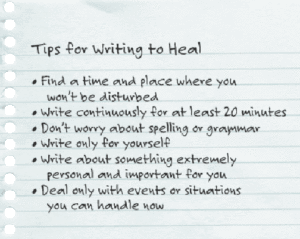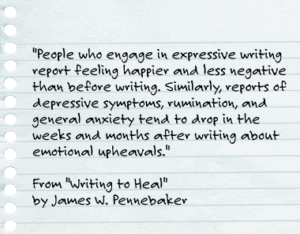| Mindful writing, also called expressive writing, is a therapeutic writing process that has many benefits.
It has been used in hospitals, homes, prisons, schools, and other settings. Research has shown that expressive writing can improve physical and mental well-being. However, anyone who wants to explore their thoughts and feelings and stimulate creative ideas will find expressive writing useful. Expressive writing is often used to alleviate unresolved trauma by helping the person release pent-up emotions, put things into a larger perspective, and provide a way to organize troublesome feelings. James Pennebaker, Ph.D., a professor of Liberal Arts and Psychology at the University of Texas at Austin, and author of several books on expressive writing, including Opening Up by Writing it Down says: “Putting negative emotions into words seems to blunt their effect on us. There is a part of the brain, the right prefrontal cortex, involved in effortful control over emotional states. When this part of the brain ‘turns on,’ other parts of the brain that are related to strong negative emotions–such as the amygdala–are turned off. In other words, putting our deeply emotional experiences into language and words facilitates our brain’s capacity to help us manage our emotional states.” Expressive writing involves revealing emotionally painful secrets–in a safe way. No one needs to know what you are writing, except for you. When we keep secrets, we are restraining ourselves physically and emotionally. This restraint takes a toll, creates stress, and harms our minds and bodies. By disclosing our secrets through writing, we find a safe space to release these negative thoughts and feelings, and our health and mental state benefit. But you don’t need to have experienced trauma to receive benefits from engaging in expressive writing. Expressive writing can: · Help you reveal your emotions about the past and the present. By describing yourself and your current state, expressive writing allows you to experience your feelings, acknowledge what you’ve been through, validate how it may still pain you, and digest those feelings to bring you into a new place and perspective. · Have cathartic effects. Writing can increase your ability to release feelings. It can be a safe way to let out anger, grief, and other difficult emotions. It may help you decide what actions, if any, you wish to take. · Lead to a resolution of emotions that you weren’t entirely aware of. You may become better able to understand and accept events that you find troublesome. After writing about a particular painful emotion, you may find that new emotions arise, such as relief, comfort, pride in surviving, and courage to continue. · Bring about a sense of satisfaction and accomplishment. Shaping events into a story can allow you to feel you have created something meaningful, expressive, and true to yourself. This can bring about a deeper sense of connection to yourself and your world. There are various ways to engage in expressive writing. Here are some instructions from Dr. Pennebaker: |

|


